Over 500 Loudoun Co. Teachers Ready To Tackle Dyslexia With New IMSE Training
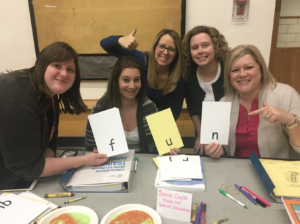
Kelly Gesser, a reading specialist at Madison’s Trust Elementary School in Loudoun County, Va., during IMSE’s OG training.
When educators in Virginia’s Loudoun County Public Schools system began realizing core instruction alone wasn’t meeting the reading needs of its dyslexic students, the district knew it needed a change, said Jennifer Sassano, the supervisor of instructional facilitators for specialized reading, when she talked to the Journal this fall.
Now, over 500 teachers and educators across the district are trained in the Institute for Multi-Sensory Education’s Orton-Gillingham methodology, creating a renewed spirit of progress, hope and potential that is sweeping through its schools and classrooms.
“We reached out to IMSE last year because we realized we need more interventions in our toolkit,” Sassano said. “To make progress with students with disabilities, like dyslexia and other learning disabilities, we felt like we could benefit from a structured, multi-sensory approach like [IMSE’s] OG.”
Across the district’s 88 schools, Sassano said students with disabilities and learning difficulties like dyslexia weren’t meeting the mark when it came to standardized testing in reading while the majority of other students performed well.
To ensure all students received the specialized instruction they needed to succeed, Sassano said her team began researching ways to help address the needs of those students struggling.
What she found was the Institute for Multi-Sensory Education.
“We’re using many different things, but for Orton-Gillingham training specifically, we really feel IMSE puts the best training programs together,” Sassano said. “It’s very comprehensive, we love the drills that the teachers get, we love the trainers, the trainers are all great quality, and we’ve just been getting excellent feedback from the teachers.”
By the end of December, Loudoun County schools will have just over 500 IMSE-trained teachers in 82 of its schools, with another 243 educators signed-up for trainings through June, Sassano said.
Learn more about how this school district transformed its approach to early literacy.
Ultrarunner Running 43 Miles To Raise Funds For Reading Center

Melissa Raguet-Schofield with her husband Rob and their son William
Melissa Raguet-Schofield describes being a mother of a dyslexic child as “like running through the wilderness all by yourself.”
And this summer, Raguet-Schofield, an adjunct professor of anthropology at Colorado State University, literally ran through the wilderness to raise funds for the Children’s Speech and Reading Center of Northern Colorado, where her dyslexic 7-year-old son, William, visits twice a week for Orton-Gillingham instruction.
“It has felt great to take all this negativity and turn it into something positive,” said Raguet-Schofield, who has a bachelor’s and PhD from University of Illinois. “Providing for this reading center will be able to help children who would otherwise possibly end up on a really bad path.”
Read more of her inspiring story here.
Special Ed Teacher Says IMSE’s OG Training Changed Her Life
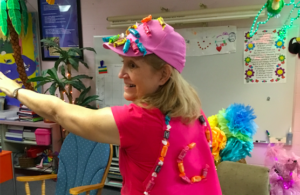
Donna Cortright as Captain Candy
Donna Cortright is currently Captain Candy.
That’s how Cortright, a special education teacher for kindergartners through fifth-graders at Ossian (Indiana) Elementary, is teaching her students the letter C and how to sound it out after she received The Institute for Multi-Sensory Education’s Orton-Gillingham training this summer.
“Orton-Gillingham lets me be creative,” said Cortright, who has been an elementary school teacher for 30-plus years, including the last quarter century at Ossian Elementary.
Cortright said IMSE’s week-long OG training changed her life. She has been trained in other reading programs, but likes how IMSE’s OG training allows her to be flexible and patient with her students.
“The more I listened, the more I liked it,” she said. “The approach is based in a way that you can teach it. It was fabulous. For my severely dyslexic kids and youngest students, we’re using more and more of this.”
Here more about her creativity in the classroom here.
IMSE OG Graduate Heading To Jordan To Work with Teachers at Syrian Refugee Camps
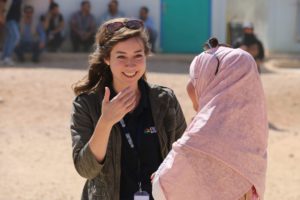
Lauren Jackson at a Syrian refugee camp in Jordan
Garret Jackson has seen the power of the Institute for Multi-Sensory Education’s OG training work with her students in Texas.
This year, she was able to witness for herself how her training translated in Jordan with thousands of Syrian refugees.
“IMSE’s OG is a very concrete and hands-on way to make phonics systematic and real,” said Jackson, an IMSE OG certified graduate who is a reading instructional specialist at South Bosque Elementary in Waco, Texas. “I’ve seen how it transforms lives here, and I’m hoping we can make it work for the [Syrian refugees] in their situation.”
Jackson embarked on a two-week trip to Jordan in November, where she visited two Syrian refugee camps — in Azraq and Zaatari. Tens of thousands of refugees live at the camps, and Jackson spent time focusing on teaching phonetic instruction to students in elementary through eighth grades.
Read more about the amazing work she’s doing here.
Super Bowl Champ Malcolm Mitchell Is A True Champion Of Youth Literacy

Wide receiver Malcolm Mitchell this year won a Super Bowl with the New England Patriots.
Wide receiver Malcolm Mitchell this year won a Super Bowl with the New England Patriots, but his biggest accomplishment has been leading the nonprofit Share the Magic Foundation, which transforms the lives of young students through literacy.
Mitchell in 2016 launched the organization, which promotes the long-term benefits of reading and book ownership among students in Title I schools and underserved communities. He also launched Read with Malcolm Literacy Initiative.
Mitchell, a former star at the University of Georgia, said the organization’s goals are to introduce book ownership to students in households where reading is not a priority and to improve literacy in schools with below grade-level reading skills.
The athlete read at a junior high level when he entered Georgia but devoted countless hours to reading during his time at college and beyond. He spoke with the IMSE Journal about his experience growing up, and why literacy is so important to him now.
From Struggling With Dyslexia To Working For NASA, This Engineer Helped Pave The Way For Others

Lawrence Schneider is a vet, author and sculptor whose dyslexia helped him utilize creative thinking and instilled hard work.
As a boy struggling with dyslexia, it was hard for Lawrence Schneider to imagine life past the third grade. Little did he know, by his twenties he would be thrust into the height of the space race as a research engineer for NASA.
Now, with a new book called “Say Yes On Saturday,” he’s sharing his story of hard work, perseverance and how he came to believe in himself — so others like him can, too.
“I had learned that if I keep trying and not give up that I could defeat it,” Schneider said. “I decided that I could do anything I want to do. If I’m willing to work at it, I could do it. And actually, it turned out that way.”
Schneider graduated with a degree in aeronautical engineer in 1959 and worked for the Army Ballistic Missile Agency before heading to work for NASA in the midst of the space race, where he worked as a research engineer.
Schneider became a college professor, airplane pilot, computer systems manager for the federal government and has even mastered the art of sculpting.
Read more of his profound story here.
Arlington, VA Says IMSE’s OG is Integral to Helping Children with Dyslexia Read with Success
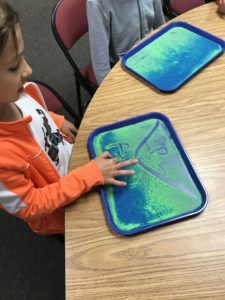
Arlington Virginia students utilizing IMSE’s OG skills in the classroom.
IMSE’s Orton-Gillingham training is a really big deal at Arlington (Va.) Public Schools.
More than 300 teachers in the K-12 school system have been trained in IMSE’s Orton-Gillingham approach, according to Dr. Kelly Krug, Supervisor of Arlington Tiered System of Support (ATSS).
“While more and more districts are realizing the benefits of Orton-Gillingham in the general education classroom, we are always thrilled to be part of a dyslexia specific initiative because it is where the methodology started,” says Jeanne Jeup, co-founder of IMSE. “Children with dyslexia can respond so quickly and their self-confidence sores.”
Krug said the school system also includes Orton-Gillingham on the ATSS chart on all tiers so that it is noted as available to students with dyslexia or characteristics of dyslexia at every stage of the intervention process. A dyslexia brochure is available for parents and staff in both English and Spanish.
Arlington Public Schools teachers and officials say their literacy initiative has been incredibly worthwhile.
One literacy coach said: “Third- and fourth-grade students who were not meeting success with spelling found success with a more explicit approach, a multi-sensory approach. Their success is reflected in both their PALS and DSA scores. The student’s parents have also noted their children’s reading and writing confidence.”
Read more about this school district’s incredible commitment to literacy here.
12 Famous People Who Struggled With Dyslexia Before Changing The World

Cher, Anderson Cooper, Robin Williams and Keira Knightley all share a common trait: Dyslexia.
Without the proper support and education, dyslexia can often leave eager students feeling self-conscious and inadequate.
Despite difficulties in reading, there seems to be a theme that those with dyslexia are often destined for greatness.
In fact, many of the world’s most influential entertainers, thinkers and change-makers have shared their own struggles with the learning condition — including insight on how they used their different abilities to distinguish themselves from the rest.
Here’s how nine famous figures learned to overcome their struggles and harness their strength, in their own words.
“To change perceptions, we must celebrate all that dyslexic people have achieved, so that young people no longer give up before they have even started,” billionaire entrepreneur Sir Richard Branson has said.
Hear from 12 famous figures about how dyslexia has shaped their lives for the better here.
Learning Specialist: ‘Helping These Kids Is What I Was Created To Do’
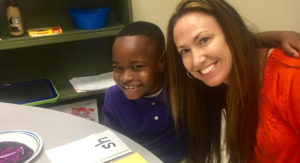
Pola Millard and one of her students, Marvin.
Pola Millard believes she’s found her true calling teaching the students at New Hope Christian Academy — and her daughter — the Orton-Gillingham methodology.Millard has a public relations bachelor’s degree from the University of Memphis but decided to earn a master’s in teaching from Union University 15 years later.
For the past six years, Millard has taught in various capacities at New Hope, a school for 3-year-olds through sixth-graders in Memphis, and since 2014 has used OG methodology. Last year, she went through the official training course in Little Rock, Ark., and her current position at the school is Reading Intervention Specialist.
Millard has 22 students from kindergarten through sixth grade that she teaches on a one-on-one basis for 30 minutes a day, two to three times per week. She’s benefited so much from the skills that she’s taking the Advanced OG training course from IMSE in Bebee, Ark..
“I’m so proud of these kids,” Millard said. “They are hard workers. They try so hard. They want to do it. They want to learn.”
Learn more about how becoming an IMSE OG-trained educator has changed her life.
Principal Led School-Wide Literacy Initiative Embraced By Community

Principal Bill Colon bringing joy the community.
National School Principals’ Day didn’t go unnoticed at Greenwood Elementary School this year: it honored Principal William Colon.
Colon, 42, who has been principal at the Toledo, Ohio school since 2007, has organized school-wide literacy initiatives and has been using Orton-Gillingham as its primary phonics program since the fall of 2015.
Greenwood is a school where 75 percent of its students receive free or reduced lunches.
Colon, a graduate of Edison High School in Milan, Ohio, and who has a bachelor’s and master’s from University of Toledo, spoke to the IMSE Journal earlier this year to discuss the reading initiatives and much more with the Journal.
See what this literacy-oriented principal had to say here.
5 Things We Learned About The Dyslexic Brain From An MIT Neuroscientist

Dr. John Gabrieli of Massachusetts Institute for Technology is a leading neuroscientist in the field of reading and reading challenges, like dyslexia.
Dr. John Gabrieli is a professor and expert neuroscientist in the Department of Brain and Cognitive Science at the Massachusetts Institute for Technology.
For over 20 years, Gabrieli has dedicated his work to learning about the science behind “how the human brain empowers people to do things” like reading — and the factors that can make reading a challenge, like dyslexia.
We asked him what he’s learned about what happens to our brains when we read, how crucial early interventions are with children who are dyslexic, and why well-validated approaches, like IMSE’s Orton-Gillingham can make all the difference.
“If we can identify children at risk effectively very early, we know the literature supports that early interventions are most effective not only for learning to read, but we also hope in any discouragement the child might have about his or her first major educational experience. If you could identify a problem before it plays out you can support a child in a way that doesn’t make them feel defeated.”
See the five biggest things we learned from our conversation here.
A New Teaching Approach Has Wyoming Inmates Reading With Success
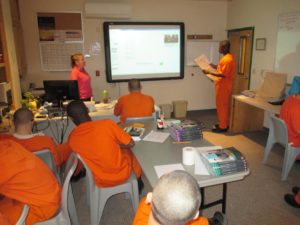
Wyoming inmates learning in a classroom setting.
Learning Latin has become a breeze for some of the inmates in the Wyoming Department of Corrections, thanks to the Orton-Gillingham methodology the educational staff has implemented into the curriculum.
Orton-Gillingham is a structured, phonics-based multi-sensory approach to teaching students to read.Teacher Gloria Wolf last year received training from the Institute for Multi-Sensory Education (IMSE) and used those skills to teach her students — many of whom “can hardly understand English” — Latin “a few prefixes, suffixes and bases a day.”
“I thought it would help improve their ability to understand vocabulary they were unfamiliar with, which is a struggle for them,” Wolf said. “What I didn’t expect was how quickly they learned it and how much it helped in every way. They began asking me the etymology of words and sharing new words they figured out on their own. But the most exciting part was when the students who had been in class a while began telling new students, ‘Just wait until she teaches you Latin. It’s awesome! I couldn’t have passed my reading test without it!’”
Wolf was one of 17 Wyoming Department of Corrections officials who received IMSE training last May in Casper, one of the state’s few large cities.
Another four who were hired after May’s session attended a training seminar in Denver in February.
Wolf said in 27 years of attending teaching workshops, the IMSE training “brought the most improvement in the shortest amount of time with the simplest implementation.” Betty Abbott, the Educations Programs Manager for the Department of Corrections, said the results in the inmate population have been “a big success.”
Learn more about this unique learning opportunity here.
Parent Perspectives: Shannon Chamberlin
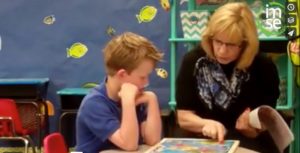
Chase Chamberlin has reaped the benefits of IMSE’s OG skills through tutoring.
Chase Chamberlin was a 5-year old in pre-school when his mother, Shannon Chamberlin, knew something was wrong.
“He was struggling to learn his letters, he didn’t know his sounds,” Shannon told the Journal.“So, we started tutoring him after pre-school, that whole summer. But by that fall, his kindergarten teacher was still concerned he was struggling.”
Chase was ultimately diagnosed with dyslexia and ADHD. Following his diagnosis, the Chamberlin family sought out a number of different types of tutoring to help their son. “I have a reading disability myself and I’ve taught elementary school, so it was really frustrating to me that I couldn’t help my own son.”As luck would have it, in time for Chase’s entry into kindergarten, Christian Academy did bring on resource specialist, Susan Lindahl.
Susan began working with Chase last school year. At the same time, she was working on IMSE’s 45 Hour Practicum. “That was great, because all the lessons are videotaped, so I could really watch Chase blossom over the time he was working with Susan,” Shannon says.
Shannon credits Susan with working hard to engage Chase in things he’s interested in, both to motivate him and to inspire confidence.
Read more about this family’s heartwarming story here.
The Institute for Multi-Sensory Education works with schools across the country to provide the IMSE-style Orton-Gillingham training that has touched hearts, minds and classrooms across the country. To see how IMSE can help change the lives of your students, learn more here.
